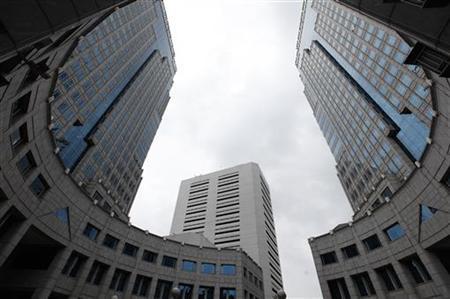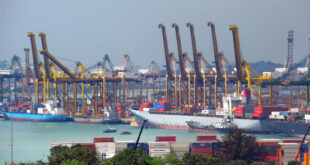Asia-Pacific central banks will probably hold off on adding monetary stimulus this week as higher oil prices combine with diminishing concern of a euro- region meltdown to make the case for preserving firepower.
South Korea and New Zealand will hold interest rates tomorrow, according to all economists surveyed by Bloomberg News. Indonesia will keep its key rate at 5.75 percent the same day after an unexpected cut last month, while Malaysia will stand pat for a fifth meeting a day later, separate surveys indicated.
The 18 percent jump in crude oil since September risks spurring price pressures in a region that’s seen little slackening in job markets as employers retain workers even with exports moderating. A report today showing Australia’s economy grew at half the pace analysts projected last quarter reminds that further stimulus may yet be warranted later this year.
“Growth or inflation risks are not compelling enough to push central banks aggressively in any direction,” said Matt Hildebrandt, an economist at JPMorgan Chase & Co. in Singapore. “Central banks have probably shifted from growth concerns to being neutral.”
Most Asian stocks and currencies have climbed this year as the region’s growth outpaces the U.S. and Europe, luring investors. Developing Asia will expand 7.3 percent in 2012 compared with 1.8 percent in the U.S. and a euro-area contraction, the International Monetary Fundforecast in January.
Iran Tensions
Oil prices have risen amid concern international tensions with Iran will disrupt supplies. South Korea said yesterday higher oil prices are making its economic outlook increasingly uncertain.
“We suspect that uncertainty over external developments will be pivotal for most central banks,” said Sukhy Ubhi, an economist at Capital Economics Ltd. in London. “Asia’s policy makers are likely to believe that it is too soon to know whether the global economy will gain momentum or falter. It is also unclear whether geopolitical tensions between Iran and the West will ease or escalate.”
Elsewhere in Asia, Malaysia may say export growth slowed in January, while Taiwan’s rebounded last month, surveys showed. In Europe, Spain may report industrial output fell for a fifth month in January from a year ago, while German factory orders probably rose at a slower pace in January from December.
U.S. companies added 215,000 workers in February, after increasing January payrolls by 170,000, ADP Employer Services may say today. The Labor Department may report non-farm productivity slowed less than earlier estimated last quarter, and the Mortgage Bankers Association will release data for loan applications.
Steady Rates
The Bank of Korea will keep the benchmark seven-day repurchase rate at 3.25 percent for a ninth month, according to all 16 economists in a Bloomberg survey. Inflation moderated to a 14-month low of 3.1 percent in February.
Australia’s central bank held rates yesterday and reiterated it has scope to cut as Europe remains a potential source of shocks “for some time yet.” Bangko Sentral ng Pilipinas will consider oil costs in deciding monetary policy, Governor Amando Tetangco said yesterday, after lowering rates last week.
Some central banks are still cutting. Vietnam said late yesterday it will reduce refinancing and repurchase rates in the “next few days” by 1 percentage point amid improved economic data and easing inflation. It last lowered the repurchase rate in July and the refinancing rate in 2009.
Surging oil prices may worsen government fiscal positions, erode company profit margins and hurt domestic consumption. Malaysian Airline System Bhd., the nation’s largest long-haul carrier, reported a 2.5 billion ringgit ($827 million) loss for 2011 as costlier fuel countered higher passenger loads.
Construction Pick-Up
Reserve Bank of New Zealand Governor Alan Bollard will leave the official cash rate at a record-low 2.5 percent, all 16 economists surveyed predict. Construction rose last quarter for the first time in six, a report showed this week, signaling the economy is picking up after earthquakes curbed demand in 2011.
Indonesian inflation slowed for a sixth straight month in February. A government plan to raise fuel prices may revive cost pressures, limiting scope for further rate cuts. Inflation may exceed the central bank’s target this year if prices of subsidized fuel increase by 1,000 rupiah (11 U.S. cents) per liter or more, Governor Darmin Nasution said in February.
Bank Negara Malaysia will keep rates “accommodative” because the global economic outlook remains uncertain, Governor Zeti Akhtar Aziz said last month. Inflation slowed to a one-year low of 2.7 percent in January while growth eased last quarter.
Source: Bloomberg
 Asia Finance News Asia finance news, banking, market analysis, business, Forex, trade, Cryptocurrency as it is happening in Asia. Trusted gateway for Asian financial news.
Asia Finance News Asia finance news, banking, market analysis, business, Forex, trade, Cryptocurrency as it is happening in Asia. Trusted gateway for Asian financial news.





